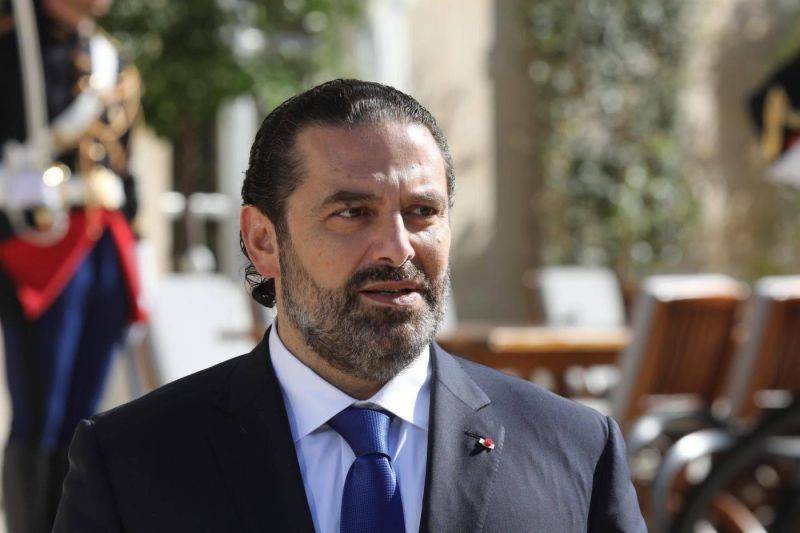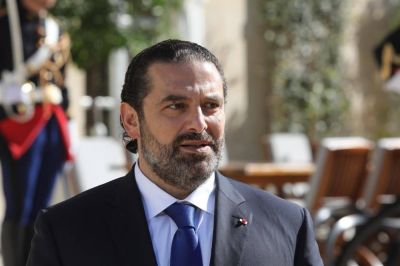
This past week, and for the first time since his appointment in October 2020, Hariri has reportedly put the option of resigning out on the table. (Credit: AFP)
He hardly ever leaves his house and appears to be anxious and agitated most of the time.
Hariri is mad at the world. He is mad at his political opponents and his former benefactors, President Michel Aoun and his son-in-law and head of the Free Patriotic Movement, Gebran Bassil. Both men accuse Hariri of preferring to rule over ruins rather than making the slightest compromise.
He is mad at Saudi Arabia, which refuses to reconsider its stance toward him despite his many discreet attempts to get back into the kingdom’s good graces.
He is mad at France, which holds him just as responsible as Aoun and Bassil for the ongoing government formation stalemate.
Hariri appears to be isolated, exhausted and cornered. This past week, and for the first time since his appointment in October 2020, he put the option of resigning out on the table.
This comes a little over a month after, on the eve of his umpteenth and last meeting with Aoun, Hariri confidently said his departure was conditional on the resignation of the head of state. So, what’s changed now?
Why does the leader of the Future Movement feel that he is losing his standoff with the president, while their position vis-à-vis each other has not really changed in recent weeks?
According to several sources in the entourage of the prime minister-designate who spoke to L’Orient-Le Jour, Hariri appears to have lost his will to battle on since his return from an international tour at the end of April.
Having visited Russia, the Vatican and the United Arab Emirates, the Sunni leader appears to have failed to secure the support he expected.
While Moscow countenances him being at the head of the government, it has also welcomed his main rival Bassil — a message that Russia is not taking sides.
What’s more, Hariri’s several visits to the UAE have also failed to yield any change of heart on part of Riyadh, which continues to refuse to rally around him, denying him significant support on the Arab and Sunni landscape.
As for his trip to the Vatican, it did not help in isolating his Christian opponents. In fact, the pope’s message was clear on the need to establish harmony between Muslims and Christians, something that is politically interpreted in Lebanon as a call for a compromise between the president and the prime minister-designate.
Upon his return, Hariri told one of his close associates that he had set a deadline for himself to achieve a breakthrough shortly after Eid al-Fitr; otherwise, he might throw in the towel.
“He has the feeling that Aoun does not want a government and that his horizons were narrow,” said the source close to Hariri.
The last straw
Criticized by some for his softness and his tendency to compromise, Hariri has since his nomination opted for a firm stance, defending the prerogatives of Sunnis and preventing the Aounist camp from being in a position of strength.
This new tactic earned him a surge in popularity on the Sunni street and the outspoken support of all the community’s leaders, including those who turned their backs on him after the 2016 presidential compromise, which resulted in Aoun becoming the head of state.
But time now seems to be working against Hariri. While the country descends further into a deep pit with every passing day, Hariri is perceived by a portion of the population and the international community as being responsible for the plummet, along with the president and his son-in-law.
This is something unacceptable for someone who saw the French initiative as an opportunity to retake center stage as the sponsor of reforms in the eyes of local and international public opinion.
The statements of French Foreign Minister Jean-Yves Le Drian on April 29 were the last straw. On the same day, following his trip to Malta, Le Drian said France had started to implement entry restrictions on certain Lebanese politicians “involved in the current political blockade.”
It has been months now since Paris made no secret of its annoyance at the situation in Lebanon, brandishing threats of punitive measures targeting the entire political spectrum, including the Hariri family, France’s main ally in the country for decades.
Le Drian’s statements threw the Future Movement into panic. Phone calls and contacts intensified to let the son of the late former Prime Minister Rafik Hariri know that several of his relatives might be on the restrictions list.
This, however, was not the end of trouble for Hariri. Le Drian’s visit to Lebanon was announced after Paris’ announcement of its punitive measures, and talk quickly emerged that the minister did not wish to meet with Hariri — a heavy blow for someone who presented himself to his opponents as the sponsor of the Paris initiative.
On Monday evening, May 3, 72 hours before Le Drian’s arrival in Beirut, Hariri gathered his cohort to assess his options.
If the premier-designate were to step down, he’d be satisfying Aoun and Bassil. If he were to remain in his post, he’d be accused of obstruction. If he decided to make concessions, a government would be formed on the president’s terms.
Hariri came to the conclusion that his first option was arguably the best step to protect his political future.
“If the French consider me to be behind the blockade, then I might as well go, and we will see if things improve,” he told a close associate.
For Mustapha Allouch, the Future Movement’s vice president, “Hariri is considering stepping down because of the pressure to hold him accountable for the political stalemate.”
As soon as this option was raised, the FPM had something to celebrate, considering that this was a step closer to its goal of getting rid of Hariri, and that this was something that might actually materialize as the result of regional developments, mainly after the visit of the Saudi intelligence chief to Damascus.
‘You are not in a position to set conditions’
Forty-eight hours before Le Drian’s arrival, no meeting with Hariri had yet been set.
It was not until the eve of the French foreign minister’s visit that Hariri finally learned with relief that a meeting was to be held.
“This confusion was a very negative indication,” said an adviser to the Sunni leader. According to him, the prime minister-designate feels that he is the victim of injustice since he believes that he has made concessions, unlike the other side.
“Saad Hariri called on the French to find a solution,” he added.
The idea of a meeting with Bassil at the French ambassador’s residence to make up for the missed meeting in Paris a few weeks earlier was suggested. Hariri once again objected, saying that he would not meet with Bassil until a government was formed.
“He told the French that it was not normal to threaten him with sanctions just because he refused to meet with Gebran Bassil,” his adviser added.
Contacts continued between the office of the prime minister-designate and the Elysée. There has been tension in these communications, especially when the French hinted Hariri agreed with the Egyptians to thwart their efforts to organize a meeting between him and Bassil in Paris.
At the beginning of April, there was talk of a possible meeting in the French capital between the two men, but things quickly fell apart mainly because of Hariri’s refusal.
At the time, the prime minister-designate asked the French for guarantees that the head of the FPM would relinquish the “blocking third” veto power in the government and facilitate the formation of a cabinet.
“You are not in a position to set conditions,” the French side reportedly replied.
The meeting with Le Drian on Thursday evening was not reassuring, especially since it took place at the French embassy in Beirut instead of Hariri’s Beit al-Wasat residence — a move the French senior diplomat put down to protocol.
According to several sources, Le Drian was very firm during the meeting.
When he brought up the punitive measures, the French foreign minister told Hariri that “people in his entourage might be affected,” a close associate of the Future Movement leader said.
The French are not hiding their disappointment with the Sunni leader, especially since French President Emmanuel Macron had invested time and resources to support him.
‘It’s not a maneuver’
At the end of this roller-coaster week, Hariri seems to have put aside the option of resigning. Why? It was not so much because of the French position, but rather the support he recently received on local and international levels.
On May 4, two days before the meeting with Le Drian, Hariri held a meeting with his parliamentary bloc to discuss the decision to step down and disclose the information to test the waters.
This prompted Parliament Speaker Nabih Berri to send his right-hand man and former minister Ali Hassan Khalil to meet with Hariri and request him to put this option aside, assuring him of Berri’s support.
Hariri also contacted Hussein Khalil, the political assistant of Hezbollah Secretary-General Hassan Nasrallah. Khalil asked him to be patient and to calm down.
Amid these developments, Berri set two choices for Hezbollah: either form a government or satisfy the demands of its Christian ally, i.e., getting rid of Hariri.
The two Shiite parties, however, quickly agreed that there was no alternative to Hariri and that they did not wish to repeat the same scenario of caretaker Prime Minister Hassan Diab.
The latter had no support within the Sunni community, which contributed to crippling him politically.
At the same time, Hariri received support from former Lebanese prime ministers, but also from Egypt and, according to his close associates, the US too.
“This does not mean that he has completely given up the option to resign. The option is still on the table. It’s not a maneuver,” Hariri’s adviser said.
All these developments are unfolding against a backdrop of renewed contact between Saudi Arabia and Iran, and between Riyadh and Damascus.
Last week’s meeting in Damascus between the Saudi intelligence chief, Gen. Khalid bin Ali al-Humaidan and Syrian President Bashar al-Assad, was frowned upon by Hariri, who does not appear to fathom the Saudi game.
“They are asking me to confront Hezbollah while they are talking to Iran and Syria,” Hariri reportedly said, according to a close associate.
The prime minister-designate does not hide his concern to see that all the rapprochement attempts on the Lebanese scene are being made at his expense.
This article was originally published in French in L'Orient-Le Jour. Translation by Sahar Ghoussoub.
